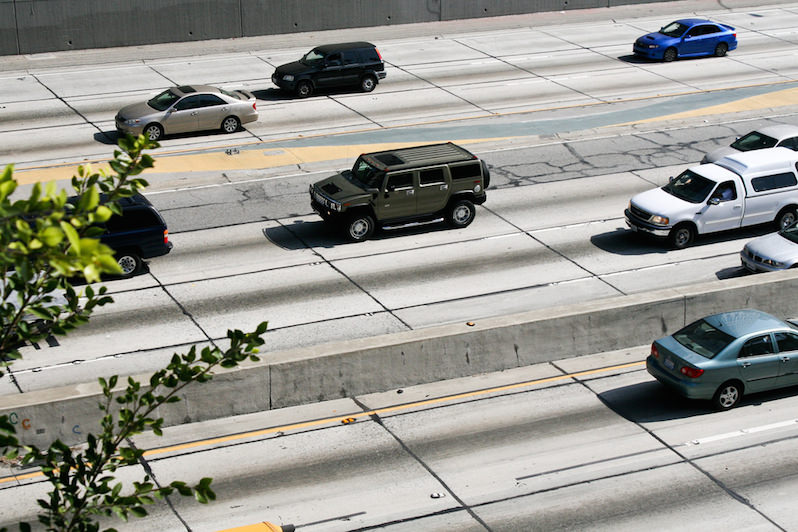Bigger Isn’t Better for Energy Savings
The desire for more spacious cars and houses is canceling out energy savings made by environmentally friendly improvements to heating and transport. Cars cruise down a Los Angeles freeway. (Alejandro De La Cruz / CC 2.0)
Cars cruise down a Los Angeles freeway. (Alejandro De La Cruz / CC 2.0)
By Inga Vesper / Climate News Network
Cars cruise down a Los Angeles freeway. (Alejandro De La Cruz / CC 2.0)
Advances made in the energy efficiency of heating and transport are lost because of people’s desire to have bigger houses and cars, two research papers have shown.
Researchers have found that houses in England, Australia, Canada, the US and New Zealand are getting bigger as people want more space and extra rooms. This means there is more air to be heated, destroying any climate benefits gained by better heating systems and more efficient insulation, they say.
The study, published in ScienceDirect, found that most house buyers struggled to understand the actual amount of energy their new home would use. Instead, they took information on energy efficiency as a yardstick for consumption.
This means house-owners may think their new, efficient home uses little energy, when in fact it may use more than their neighbours’ older, smaller houses, says Helen Viggers, a researcher at the public health department of the University of Otago in Wellington, New Zealand, and a co-author of the paper.
“There is general knowledge in the public that both house sizes and insulation standards have increased, and a feeling that both of these are probably ‘good things’,” she told the Climate News Network. “But there is less understanding of the implicit trade-off in energy requirements with increasing house size.”
Viggers is critical of measuring energy usage by square metre, as this “immediately hides [the fact] that larger houses use more energy than smaller ones”.
The New Zealand team also found that larger, stand-alone dwellings featured more “wasted” space – such as large lobbies, corner space and little-used hallways. They were designed in a less energy-efficient way than multi-home buildings or small houses.
The findings of the study mirror a 2016 paper by a team of scientists from the University of Barcelona in Spain. They compared Spanish car-buying habits with advances in the energy efficiency of engines, and found that, instead of actually saving energy, people would buy bigger and faster cars.
The Spanish researchers found that fuel efficiency would have improved by 32% and 40% for petrol and diesel cars respectively, if the cars had stayed the same size. However, they learned that car weight increased by 31% for petrol cars and 26% for diesel between 1988 and 2015, meaning modern cars actually use more fuel than those from three decades ago, despite being more energy efficient.
The New Zealand researchers admitted they did not know whether increases in efficiency directly led to larger-sized consumer objects, or whether other factors influenced people’s buying decisions. But such consumer behaviour has dire consequences for the environment, both teams warn in their papers.
With little awareness of actual energy consumption, people involuntarily increase their carbon footprint while thinking they are helping the environment, Viggers says.
She and her colleagues say policymakers and homebuilders need to come up with better, more attractive smaller homes, and should design some “stunningly good” smaller dwellings.
“They should make the maximum use of the space available, have appropriate room sizes and be aesthetically pleasing,” says Viggers, “so that buyers can see an alternative that might work just as well as a larger dwelling for their family.”
She also supports the creation of mandatory energy certificates that take into account actual consumption, and not just heating efficiency, which would allow those moving into a new home to “make a more informed decision about what that dwelling is worth”.
“Thermal modelling earlier in the design process also forces the designer and builder to explicitly choose the level of energy efficiency they want, and therefore the trade-offs they have to make,” she says.
Your support matters…Independent journalism is under threat and overshadowed by heavily funded mainstream media.
You can help level the playing field. Become a member.
Your tax-deductible contribution keeps us digging beneath the headlines to give you thought-provoking, investigative reporting and analysis that unearths what's really happening- without compromise.
Give today to support our courageous, independent journalists.






You need to be a supporter to comment.
There are currently no responses to this article.
Be the first to respond.